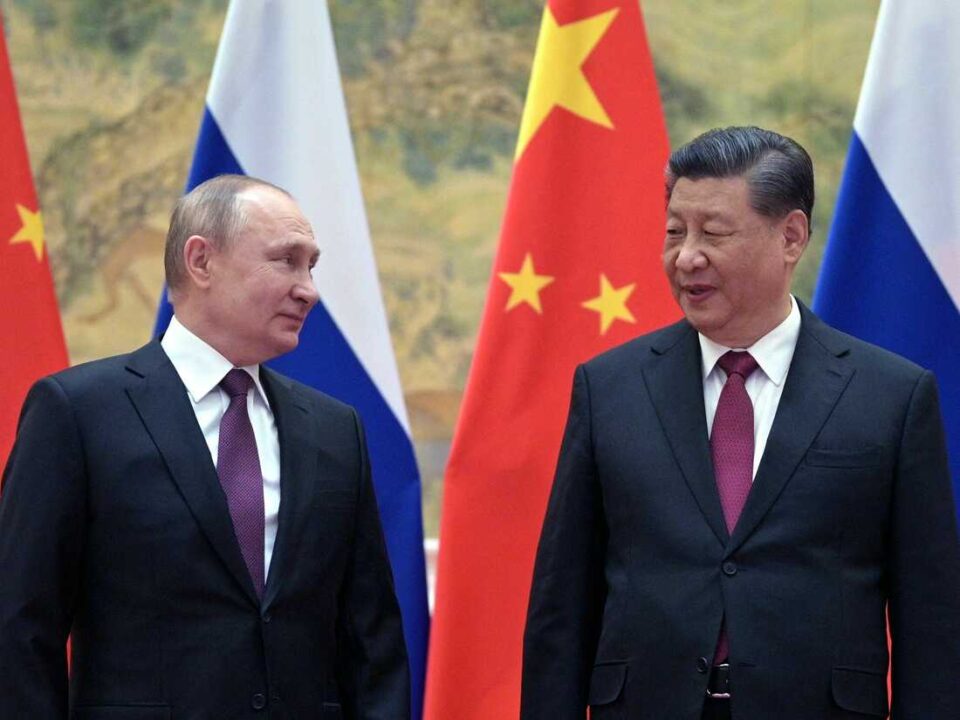We’ll talk about your proposal to end the conflict in Ukraine, Putin tells Xi.
During Xi Jinping’s eagerly awaited visit to Moscow, President Putin has stated that he will address the 12-point plan to “solve the severe crisis in Ukraine”.

The presidents addressed one another as “dear friends,” and Mr. Putin stated that he and his team were always willing to engage in negotiations.
Last month, China unveiled a proposal to resolve the conflict that calls for “ceasing hostilities” and restarting peace negotiations.
Yet the US issued a warning on Friday that the peace plan might be a “stalling technique”.
“The world should not be deceived by any tactical maneuver by Russia, supported by China or any other country, to freeze the war on its own terms,” US Secretary of State Antony Blinken said.
“Calls for a cease-fire without Russian forces being withdrawn from Ukrainian territory would essentially be endorsing the confirmation of Russian invasion,” he continued.
What assistance does China offer to Russia?

EU grants Ukraine €2 billion in ammunition in response to shell plea
China’s proposal did not make it clear that Russia must leave Ukraine, which Ukraine has stressed is a need for any negotiations.
Instead, it stressed “respecting the sovereignty of all countries,” adding that “all sides must remain sensible and exhibit restraint” and “gradually de-escalate the situation”.
The plan also denounced the use of “unilateral sanctions,” which some have seen as a subtly critical statement about Ukraine’s Western partners.
A military band welcomed Mr. Xi to Moscow on Monday. Asserting “undivided security for every country,” Mr. Putin praised China for doing.
Mr. Xi replied to Mr. Putin by saying: “Russia has advanced much in its flourishing development under your tenacious leadership. I have no doubt that the Russian people will continue to firmly support you.”
Before Mr. Xi arrived, Mr. Putin stated in China’s People’s Daily that “aggressive” US policies would not harm the two countries.

Publicly, Ukrainian leaders have emphasized their shared respect for sovereignty and territorial integrity with China.
Yet in secret, they have pushed for a conversation or meeting between Mr. Xi and President Volodymyr Zelensky.
In Kyiv, there is concern that China’s support for Russia—currently centered on trade and technology—might shift to a military nature and involve artillery shells.
Oleksiy Danilov, the secretary of Ukraine’s National Security and Defence Council, stated that if China did decide to publicly send weapons to Russia, it would effectively be taking part in the fight on the side of the aggressor.
Yu Jie, a research fellow on China at Chatham House, stated that it was in Beijing’s best interests to stabilize the relationship with Russia, with which it shares a 4,300km (2,700 mile) border.
Oil is a major component of Beijing’s enormous economy, and Russia is viewed as an ally in defying the US.
Ms. Yu noted that by serving as a mediator between Iran and Saudi Arabia, which have now reopened diplomatic relations, Mr. Xi has just achieved diplomatic success.
He might use this as an opportunity to consider acting as a mediator between Russia and Ukraine.
The seven-course meal, which included nelma fish from the Pechora River in northern Russia, a classic Russian seafood soup, and pancakes with quail, was served to Mr. Xi on Monday night along with Russian wine.
The “full explanation” of Moscow’s actions in Ukraine would be provided over dinner, according to presidential spokesperson Dmitry Peskov. The primary day of the visit, Tuesday, will feature discussions between the Russian and Chinese teams.
Days prior to the encounter, the Russian president was the subject of an arrest warrant issued by the International Criminal Court (ICC) on suspicion of war crimes.
Since neither China nor Russia are on that list, Mr. Putin might theoretically be detained in 123 different nations.
Making a trip to Moscow so soon after the ICC’s announcement implies that China believes it has “no obligation to hold the Kremlin accountable” for the crimes committed in Ukraine, according to Mr. Blinken.
Following Russia’s full-scale invasion of Ukraine in February of last year, Western politicians have been trying to isolate Moscow ever since.
Nevertheless, they have been unable to forge an international consensus since China, India, and a number of African countries are hesitant to denounce Mr. Putin.





